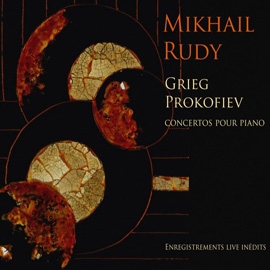In kongenialer Zusammenarbeit gelingt es Mikhail Rudy und Mariss Jansons mit einem Maximum an Nuancen Kontrasten und Farben sowie einem viel Sinn machendem Rubato den lyrischen Charakter des Grieg-Konzerts herauszuarbeiten, ohne das Verspielt-frische, respektiv das Virtuose zu vernachlässigen. Das führt zu einer sehr lebendigen und extrem spontan wirkenden Darstellung, in der kraftvolle Bravour und poetische Lyrik mit viel Gespür richtig platziert und dosiert werden.
Gefühlsintensität ohne Sentimentalität, das sind die Eckwerte dieses überaus feinen und spannungsvollen Musizierens. Rudy reizt mit ‘Samtpfoten’ besonders die stimmungsträchtigen lyrischen Themen sehr aus und macht sie mit aufregender Zartheit zu den eigentlichen Höhepunkten des Konzerts, aus denen heraus sich die Kraft für die gewichtigeren Passagen entwickelt.
Nicht nur die Ecksätze sind großartig gelungen, auch das Adagio haben wir selten so schön und natürlich empfunden gehört.
Was dann in den Solostücken folgt, festigt die Meinung, dass Mikhail Rudy genau der geniale Pianist ist, für den ihn viele völlig zu Recht halten. Die wunderbar einfühlsame und pianistisch reiche Gestaltung von Isoldes Liebestod, oder das Chopin-Nocturne, die fingerbrecherische Etude von Debussy, das Prokofiev-Prélude und die quirlige Scriabin-Etüde sind Beispiele für inspiriertes und technisch exzeptionelles interpretieren.
Prokofievs teuflisch schwieriges Zweites Klavierkonzert wechselt zwischen berserkerhaften und ruhigen Passagen, und Mikhail Rudy verbindet diese wechselnden Stimmungen kohärent musikalisch, nie zirzensisch. Prokofievs aufgewühlte Musik braucht einen solchen Interpreten, der nicht nur drein haut, den Klang also nicht zum Gehämmer werden lässt. Schade, dass das Orchester dabei zu sehr im Hintergrund bleibt, auch wenn Jansons es gut im Griff hat und Rudy gut folgt. Aufs Ganze gesehen ist dies aber eine herausragende Interpretation mit einer elektrisierenden Spontaneität.
In a congenial collaboration, Mikhail Rudy and Mariss Jansons succeed in bringing out the lyrical character of the Grieg concerto with a maximum of nuances, contrasts and colors as well as a rubato that makes a lot of sense, without neglecting the playful freshness or the virtuosity. This leads to a very lively and extremely spontaneous performance, in which powerful bravura and poetic lyricism are placed and dosed with great sensitivity.
Emotional intensity without sentimentality are the cornerstones of this extremely fine and exciting music-making. With ‘velvet paws’, Rudy makes the most of the atmospheric lyrical themes in particular and turns them into the actual highlights of the concerto with exciting tenderness, from which the strength for the weightier passages develops.
It is not only the outer movements that are superbly accomplished, we have rarely heard the Adagio played so beautifully and naturally.
What then follows in the solo pieces reinforces the opinion that Mikhail Rudy is exactly the brilliant pianist that many rightly consider him to be. The wonderfully sensitive and pianistically rich interpretation of Isolde’s Liebestod, or the Chopin Nocturne, the finger-breaking Etude by Debussy, the Prokofiev Prelude and the lively Scriabin Etude are examples of inspired and technically exceptional interpretation.
Prokofiev’s fiendishly difficult Second Piano Concerto alternates between berserk and calm passages, and Mikhail Rudy combines these changing moods in a coherent musical, never circus-like manner. Prokofiev’s agitated music needs an interpreter who does not just let the sound become a hammering. It is a pity that the orchestra remains too much in the background, even if Jansons has it well under control and follows Rudy well. Overall, however, this is an outstanding interpretation with an electrifying spontaneity.
https://www.pizzicato.lu/mikhail-rudy-i-was-very-lucky-not-to-be-formatted/


















